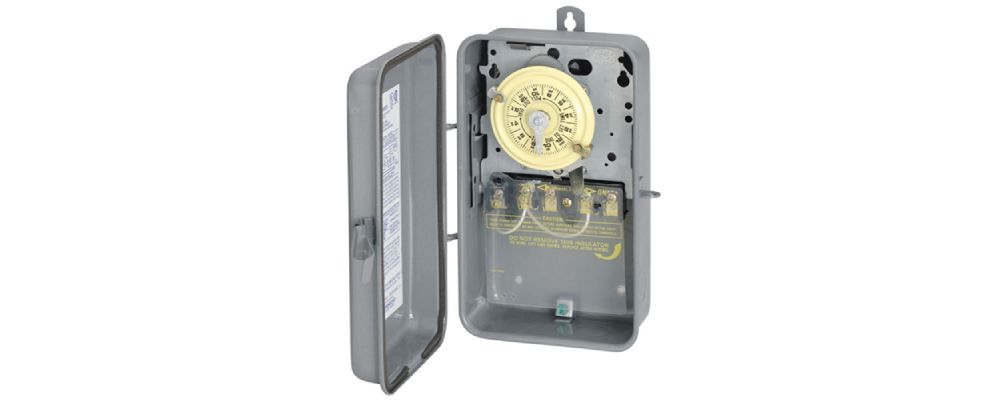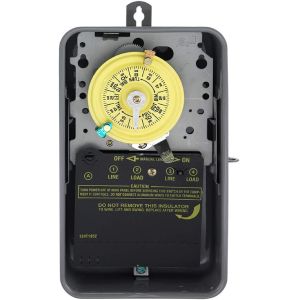- Salt Water Pool and Spa
- Pool Pumps
- Pool Pump Timer
Pool Pump Timers
A pool pump timer is a handy device that can be used to regulate pool operation or run-time schedule for your pump, filter, heater and salt system. You will save money by regulating the amount of time you operate your pool system and reduce the amount of time you spend maintaining your pool. They can be relied on to keep your pool or spa system running smoothly all season long without the hassle.

We all want to spend more time enjoying the pool, relaxing in the sun and spend less time worrying, a timer can help take some of the burden away by regulating all components of your pool system. They give pool owners the ability to control everything simultaneously and in some cases extend the life of your hardware and increase the overall health of your pool.
Salt System Run Times
In addition to automating the main parts of your pool system there are other uses for an electrical timing device. They can be used to automate your hot tub system, water features, lighting and just about anything electrical around your pool or spa. You can control your entire pool from almost anywhere with the touch of a button on your smart phone, tablet or computer with some of the pool automation systems on the market.
If you own a salt water pool, the need to automate your pool system is even more important because the salt water system won't produce chlorine unless water is circulating through the cell. In some salt systems you will find there are timers or control panels but in some there aren't so you will need an external pool pump timer. We'll talk more about salt water system pool run times and which systems require an external timer below including our recommended pool pump timers section.
Your pool system including chlorine generator should be operated often enough to completely turn your pool water over at least every 12 hours or twice a day. The run times required to achieve this will vary significantly because it's affected by the pool size, pump horse power, filter size and the resistance to flow or total dynamic head of your plumbing system. If you would like more information about choosing the right size pool pump read our pool pump sizing page.
In addition to understanding the pump run times to achieve adequate turnover you will also need to figure out through trial and error how much chlorine to produce by using the adjustable output setting. The amount of chlorine you need produced will vary depending all of the following factors:
- Direct sunlight
- Quality of water
- Filter system
- Pool usage
- Rain
- Indoor or outdoor
Run your system to run for 8-12 hours a day and set the chlorine output on the generator to 50%. After testing and determining the free chlorine readings over a few days, adjust the output on the generator only. If you leave the pump run-time the same you will learn how adjusting the chlorine output will affect the chlorine production in your pool. The goal is to keep your free chlorine over 2.0 ppm and under 4.0 ppm and since this fluctuates with the variables mentioned above, it's a good idea to keep a written record initially especially if you find you are using the super chlorinate feature more than once a week.
The average pool system needs to run anywhere between 4-10 hours so you will have to gauge it yourself though testing over time. The reason why variable speed pool pumps are becoming so popular is because of their ability to run at low energy speeds for longer periods of time while being quieter, more energy efficient and increasing the health of your pool.
Do I Need a Pool Pump Timer?
If you are deciding whether you need a pool pump timer it's a good idea to start with the salt system you are using. It can be confusing because some systems have control panels which are basically timers built into the system while others have chlorine output regulation that can be adjusted either as a percentage or output level.
We've put a list together of the common salt systems and whether a timer is built into the system or not. The first list has all the systems that will require a timer if you want to automate your system and the second list are the systems that have a built in timer so a pool pump timer is optional if you want to automate your entire system.
Pool Timer Required
- Hayward Aqua Rite
- Pentair Intellichlor
- Zodiac AquaPure Ei
- Jandy AquaPure
Pool Timer Optional
- Hayward Aqua Trol Above Ground
- AutoPilot Digital and Soft Touch
The level of automation and chlorine production varies with different units so it's a good idea to research your salt system before deciding if an external timer is necessary. The bottom line is if you want to add automation to your pool and make life a little bit easier a pool pump timer is an affordable device that will only make things simpler in the long run.
Which Pool Timer Should I Use?
Choosing the right pool pump timer for your pool should start with taking a look at what you want to control or automate. The most basic timer will turn a single pump on and off while some timers will adjust the setting on your variable speed pump and control just about anything electrical in your pool system.
Other considerations you need to keep in mind are how much HP you need to control, upper limit of amps required and how many devices you want to control. The most common HP capabilities you will find range from 2-5 HP which is more than enough for most residential pool applications. It's also common to find timers that handle up to 12 devices so you can be sure to automate just about anything that keeps your pool going.
If you are operating a variable speed pool pump you will need a timer that switches from high to low speeds. The Intermatic T106R timer will help you regulate your pump but you will also need to purchase the T104 if you want to be able to control ON/OFF setting through a timer.
If you live in a climate that experiences freezing temperatures you may want to use a pool pump timer with freeze protection. The Intermatic PF1102 pool timer works in conjunction with an existing timer to protect against freeze damage by automatically turning on the pump when the air temperature drops below the temperature preset on the thermostat.
Top Rated Pool Pump Timers
We've put together a list of the best timers on the market based on customer feedback, quality and performance. If your pool system requires additional automation these devices are a great investment and if you aren't familiar with electrical installations we recommend hiring a professional to install your timer.
The timers listed below are sufficient for most residential pool owner's that want to control ON/OFF functions of pool hardware including pump, heater and chlorine generator. All the Intermatic mechanical time switch devices below are designed to make controlling the functions of your pool easier. Whether you want to automate your pool while you are at work or travelling they will get the job done.
Intermatic 24 Hour Mechanical Time Switch for Outdoor UseIf you click on this link and make a purchase, we may earn a commission. |
Whether you have a salt water pool or a regular chlorine pool there are endless uses for a pool pump timer and hopefully the above information makes your decision a little easier. We'd like to hear from you if you have any questions or comments and we can be reached by filling out our contact us form.
Disclaimer
Please use all appropriate and proper safety precautions when attempting projects on this website. All projects are attempted at the reader's own risk.
Salt Water Pool and Spa™ participates in the Amazon Services LLC Associates Program, as an Amazon Associate we may earn a commission from qualifying purchases.
